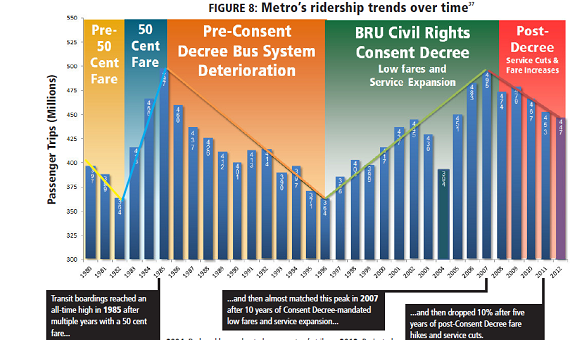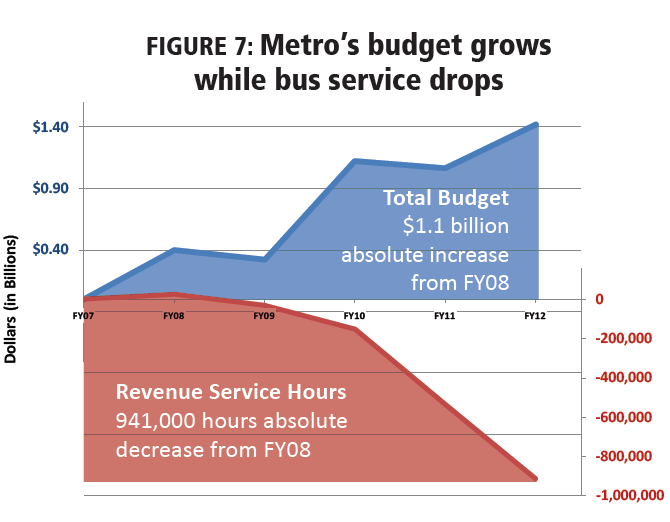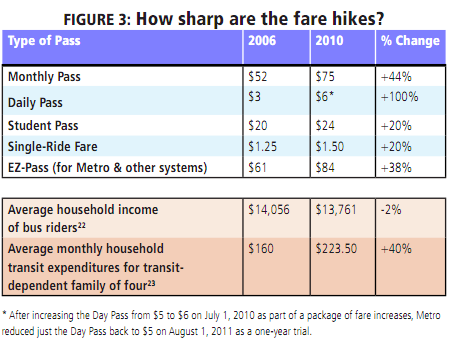[caption id="attachment_66643" align="aligncenter" width="570" caption="Happy Halloween, transit riders. All charts via: Transit Civil Rights & Economic Survival in Los Angeles"] [/caption]
[/caption]
Yesterday afternoon, the Bus Rider's Union and thirteen allied organizations released "Transit Civil Rights & Economic Survival in Los Angeles: A Case for Federal Intervention in LA Metro," a report detailing how service cuts and fare hikes have devastated working class families in the past four years. Since the expiration of a court ordered consent decree which mandated levels of service, Metro slashed 12% of its bus service hours while approving a series of fare increases.
“The tragedy of the MTA policies over the last four years is that they roll back almost all of the transit improvements – namely more buses, more bus lines, and lower fares – that MTA implemented under federal court order in response to the BRU’s civil rights lawsuit and 10-year federal consent decree,” states Barbara Lott-Holand, the co-chair of the Bus Riders Union and a transit rider herself for the last 35 years.
Metro and the BRU are awaiting the results of a Civil Rights Audit conducted by the Federal Transit Administration at the request of the Bus Riders earlier this year. Only transit agencies in Atlanta and Los Angeles underwent this review in the past year.
A lot of the facts and figures found in the report won't be new to regular readers of Streetsblog and others familiar with recent Metro policy, but it's still striking to see some of the figures laid out, showing the cumulative impact of the service cuts and fare hikes that have been a major part of Metro's bus planning since 2007. The BRU also rejects Metro's argument that the cuts are about increasing efficiency noting that Metro's buses carry more passengers per mile than any bus fleet in America except New York City's.
[caption id="attachment_66641" align="aligncenter" width="570" caption="This chart is an update of one that appeared in an early draft of the report and a previous version of this article."]
The report goes on to argue that the cuts and hikes have a disproportionate impact on struggling minority communities noting the higher rates of unemployment and poverty facing many bus riders. 90% of all bus riders are from minority communities and over 70% of all transit riders are minorities in Los Angeles. In Los Angeles county alone, African Americans are facing a 19% unemployment rate while Latinos face 14% unemployment.
Some of the numbers in the report are a result of timing. Much of the increase in Metro's budget comes from Measure R, the half-cent sales tax passed by L.A. County voters in 2008 to fund transit and road improvements. While most of the funds in these projects are "locked in" to certain projects and can't be readily moved to fund transit operations, other sales taxes dedicated to Metro are more fluid. One of the reports arguments is that some of those funds that are going towards rail expansion ought to be used instead to protect bus service and fare costs.
 The result of all these cuts and increases is reduced ridership in an era where people have less disposable income to spend. As a result, people's ability to care for their families is reduced or their dependency on an expensive automobile is increased.
The result of all these cuts and increases is reduced ridership in an era where people have less disposable income to spend. As a result, people's ability to care for their families is reduced or their dependency on an expensive automobile is increased.
“When bus service cuts make it hard for people to get to medical appointments, jobs that feed their families, and schools, it’s an attack on their health and their rights," explains Martha Arguello, Director of the Los Angeles chapter of Physicians for Social Responsibility. "And in the worst-polluted city in the US, Metro’s policies have driven down mass transit use, and the health effects of more cars on the road are devastating for low income children and families. ”
 [/caption]
[/caption]The report concludes with a series of potential fixes to the bus cuts/fare hikes crisis outlined in the report.
- Reinvest resources in the bus system and keep resources in neighborhoods: Any changes to the bus systems made in the name of efficiency should be invested 100% back into the bus system.
- Open an honest debate about Metro’s funding allocation decisions based on transparent accounting of the availability
- of operation eligible funds.
- Decisions about service changes should protect civil rights and be based on fair and balanced analysis of modes and
- efficient use of resources.
- Ensure minimum impact of service changes through strict standards for alternative service.
Joining the Bus Riders Union in the release of the report are the Coalition for Humane Immigrant Rights of Los Angeles, Communities for a Better Environment, East Los Angeles Community Corporation, Koreatown Immigrant Workers Alliance, Los Angeles Community Action Network, Physicians for Social Responsibility – Los Angeles, Public Advocates Inc., Restaurant Opportunities Center – Los Angeles, SEIU-United Service Workers West, SEIU-United Long Term Care Workers, Southeast Asian Community Alliance, Strategic Action for a Just Economy, and Urban Habitat.





